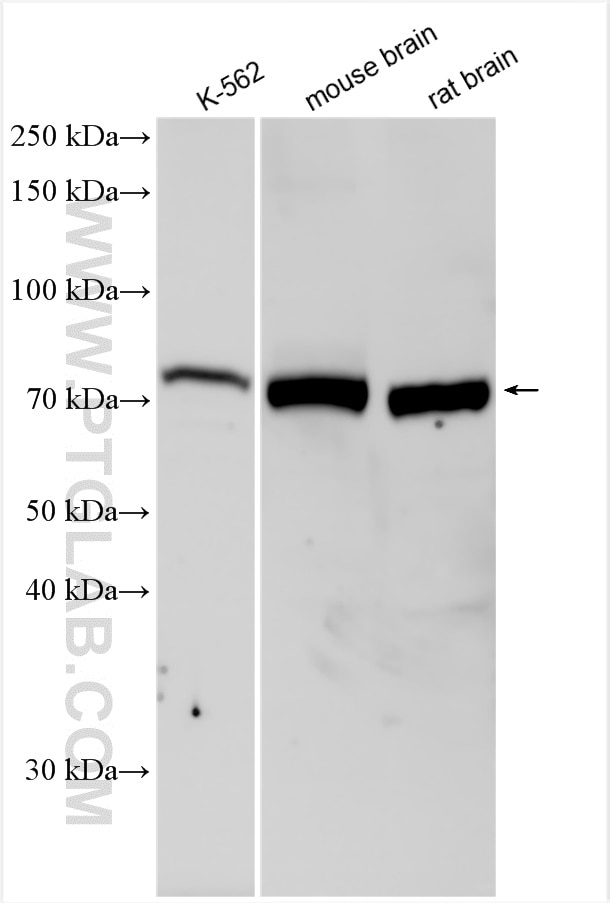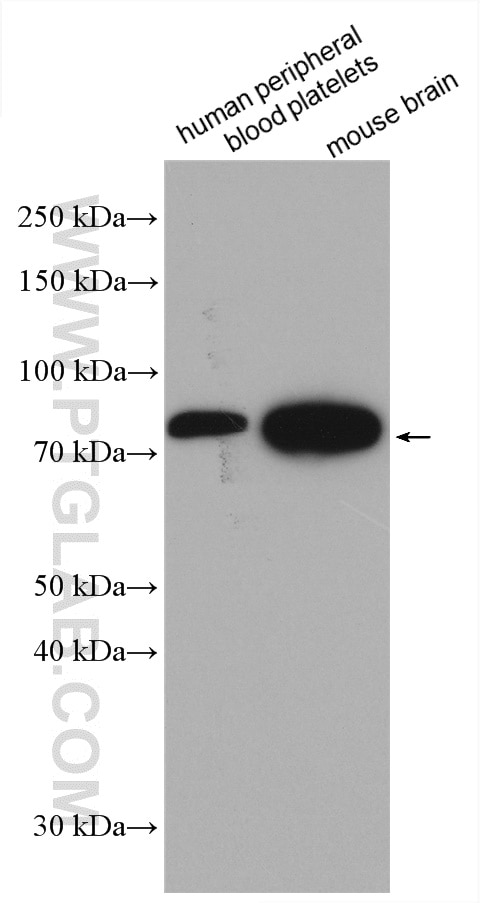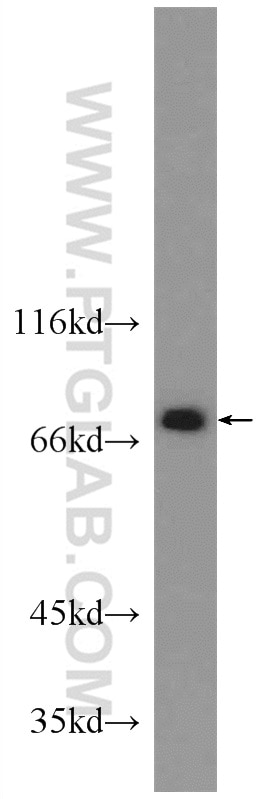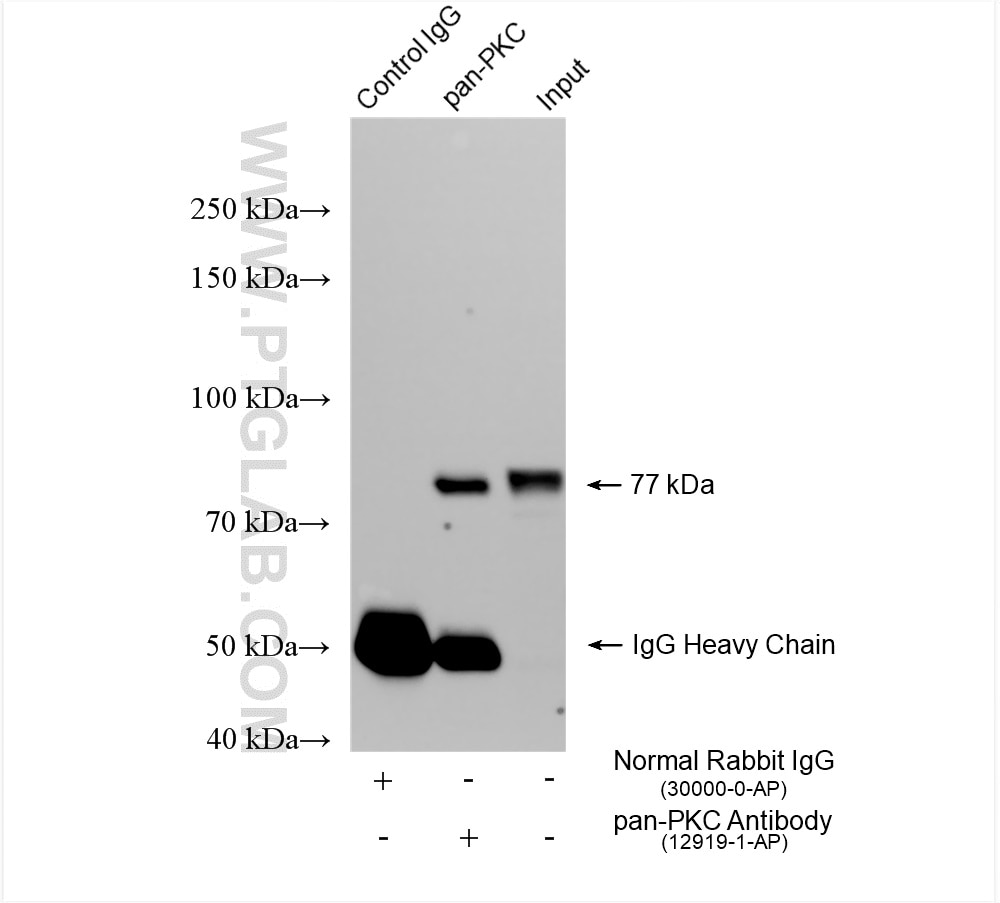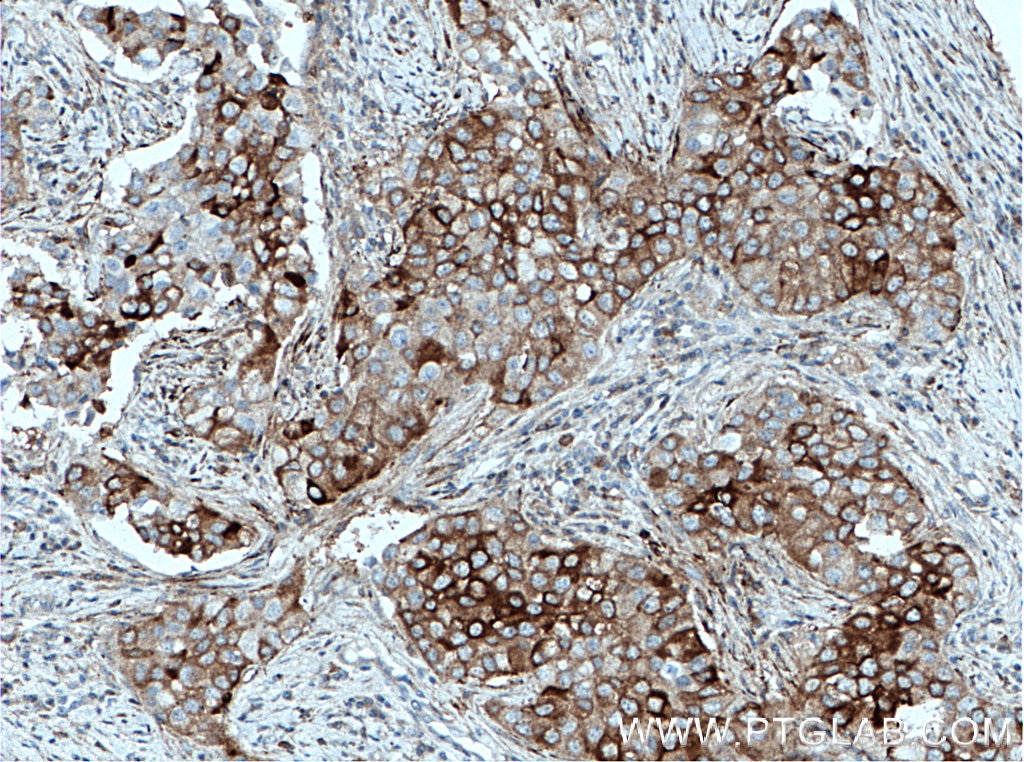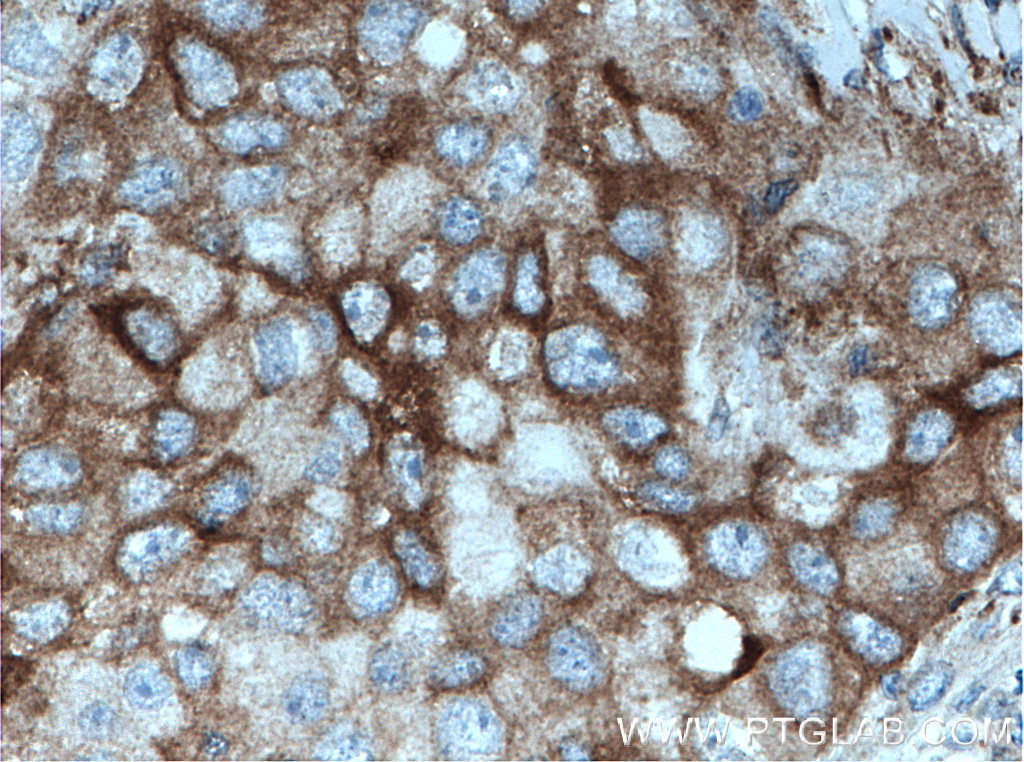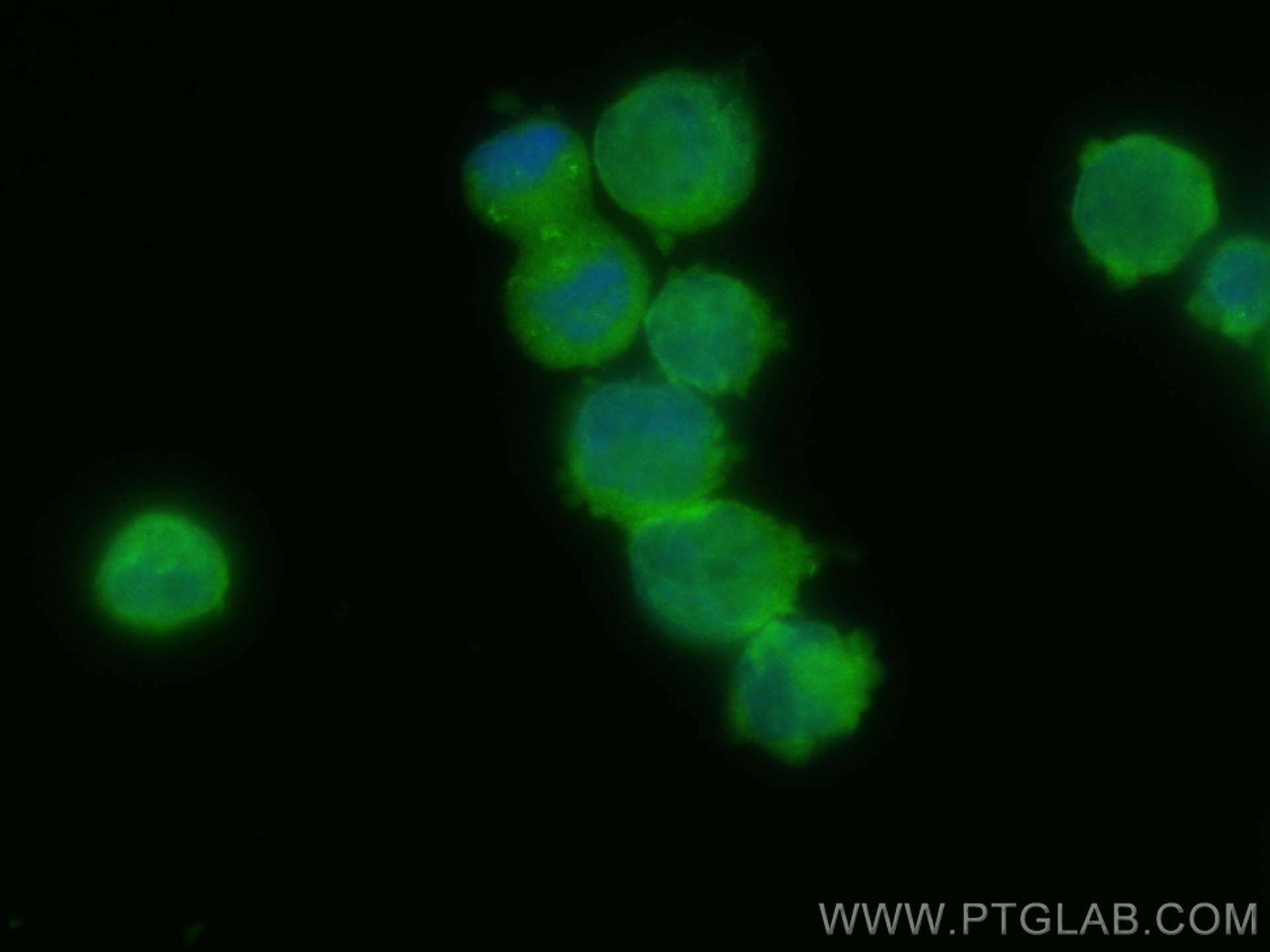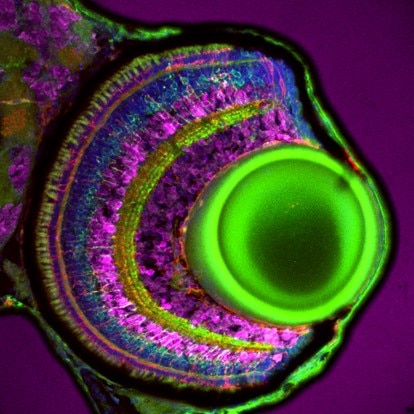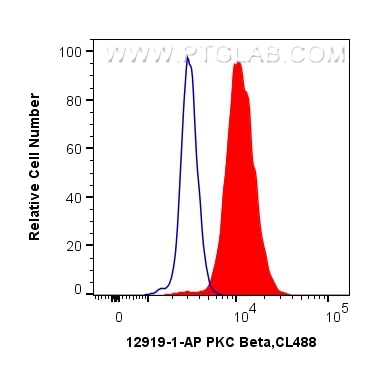- Phare
- Validé par KD/KO
Anticorps Polyclonal de lapin anti-pan-PKC
pan-PKC Polyclonal Antibody for WB, IHC, IF, IF/ICC, FC (Intra), IP, ELISA
Hôte / Isotype
Lapin / IgG
Réactivité testée
Humain, poisson-zèbre, rat, souris
Applications
WB, IHC, IF, IF/ICC, FC (Intra), IP, CoIP, ELISA
Conjugaison
Non conjugué
N° de cat : 12919-1-AP
Synonymes
Galerie de données de validation
Applications testées
| Résultats positifs en WB | cellules K-562, plaquettes de sang périphérique humain, tissu cérébral de rat, tissu cérébral de souris, tissu de thymus de souris |
| Résultats positifs en IP | tissu cérébral de souris, |
| Résultats positifs en IHC | tissu de cancer du sein humain, il est suggéré de démasquer l'antigène avec un tampon de TE buffer pH 9.0; (*) À défaut, 'le démasquage de l'antigène peut être 'effectué avec un tampon citrate pH 6,0. |
| Résultats positifs en IF/ICC | cellules K-562, |
| Résultats positifs en IF | zebrafish retina, |
| Résultats positifs en FC (Intra) | cellules K-562, |
Dilution recommandée
| Application | Dilution |
|---|---|
| Western Blot (WB) | WB : 1:1000-1:8000 |
| Immunoprécipitation (IP) | IP : 0.5-4.0 ug for 1.0-3.0 mg of total protein lysate |
| Immunohistochimie (IHC) | IHC : 1:50-1:500 |
| Immunofluorescence (IF)/ICC | IF/ICC : 1:200-1:800 |
| Immunofluorescence (IF) | IF : 1:150-1:600 |
| Flow Cytometry (FC) (INTRA) | FC (INTRA) : 0.40 ug per 10^6 cells in a 100 µl suspension |
| It is recommended that this reagent should be titrated in each testing system to obtain optimal results. | |
| Sample-dependent, check data in validation data gallery | |
Applications publiées
| KD/KO | See 2 publications below |
| WB | See 24 publications below |
| IHC | See 3 publications below |
| IF | See 2 publications below |
| CoIP | See 1 publications below |
Informations sur le produit
12919-1-AP cible pan-PKC dans les applications de WB, IHC, IF, IF/ICC, FC (Intra), IP, CoIP, ELISA et montre une réactivité avec des échantillons Humain, poisson-zèbre, rat, souris
| Réactivité | Humain, poisson-zèbre, rat, souris |
| Réactivité citée | rat, Humain, poisson-zèbre, souris |
| Hôte / Isotype | Lapin / IgG |
| Clonalité | Polyclonal |
| Type | Anticorps |
| Immunogène | pan-PKC Protéine recombinante Ag3591 |
| Nom complet | protein kinase C, beta |
| Masse moléculaire calculée | 673 aa, 77 kDa |
| Poids moléculaire observé | 77 kDa |
| Numéro d’acquisition GenBank | BC036472 |
| Symbole du gène | PRKCB |
| Identification du gène (NCBI) | 5579 |
| Conjugaison | Non conjugué |
| Forme | Liquide |
| Méthode de purification | Purification par affinité contre l'antigène |
| Tampon de stockage | PBS with 0.02% sodium azide and 50% glycerol |
| Conditions de stockage | Stocker à -20°C. Stable pendant un an après l'expédition. L'aliquotage n'est pas nécessaire pour le stockage à -20oC Les 20ul contiennent 0,1% de BSA. |
Informations générales
Protein kinase C (PKC) is a family of serine- and threonine-specific protein kinases that can be activated by calcium and second messenger diacylglycerol. Protein kinase Cs (PKCs) are signaling molecules that play key roles in many cellular processes, including secretion, gene expression, proliferation, and muscle contraction. The PKC family is broadly divided into three subgroups: classical, novel, and atypical PKCs. These subgroups differ in both protein sequences and mechanistic requirements for catalytic activity. PKC beta is one of the PKC family members. PKC beta has been reported to be involved in many different cellular functions, such as B cell activation, apoptosis induction, endothelial cell proliferation, and intestinal sugar absorption. Studies in mice also suggest that this kinase may also regulate neuronal functions and correlate fear-induced conflict behavior after stress. This antibody can recognize PKC beta, PKC alpha, PKC gamma, PKC epsilon and PKC delta.
Protocole
| Product Specific Protocols | |
|---|---|
| WB protocol for pan-PKC antibody 12919-1-AP | Download protocol |
| IHC protocol for pan-PKC antibody 12919-1-AP | Download protocol |
| IF protocol for pan-PKC antibody 12919-1-AP | Download protocol |
| IP protocol for pan-PKC antibody 12919-1-AP | Download protocol |
| Standard Protocols | |
|---|---|
| Click here to view our Standard Protocols |
Publications
| Species | Application | Title |
|---|---|---|
Cell Rep Med A genome-wide association study identified PRKCB as a causal gene and therapeutic target for Mycobacterium avium complex disease | ||
J Hematol Oncol Integrated proteogenomic characterization of urothelial carcinoma of the bladder. | ||
Am J Respir Cell Mol Biol Intermittent Hypoxia Augments Pulmonary Vasoconstrictor Reactivity through PKCβ/Mitochondrial Oxidant Signaling.
| ||
J Cell Mol Med Brucine suppresses colon cancer cells growth via mediating KDR signalling pathway. | ||
Oxid Med Cell Longev p66Shc Mediates Mitochondrial Dysfunction Dependent on PKC Activation in Airway Epithelial Cells Induced by Cigarette Smoke. | ||
J Cell Mol Med Prostaglandin E3 attenuates macrophage-associated inflammation and prostate tumour growth by modulating polarization. |
Avis
The reviews below have been submitted by verified Proteintech customers who received an incentive for providing their feedback.
FH Ashish (Verified Customer) (05-21-2021) | This antibody gave very clear staining results in lung tissue. Very nice antibody to work.
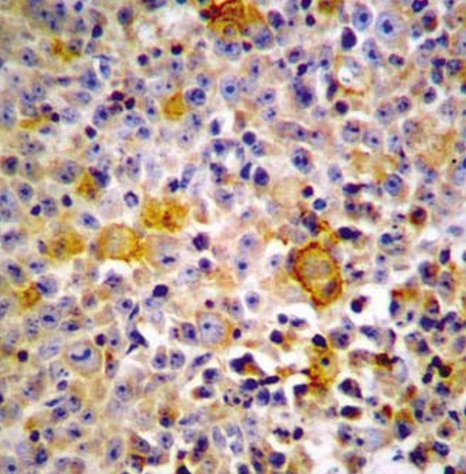 |
FH Amy (Verified Customer) (09-06-2019) | This antibody dilution gave very clear protein bands in all murine colon samples used to date. Following ECL addition, the imager took ~240 seconds to detect PKCbeta (automatic exposure). Very easy antibody to work with
|
